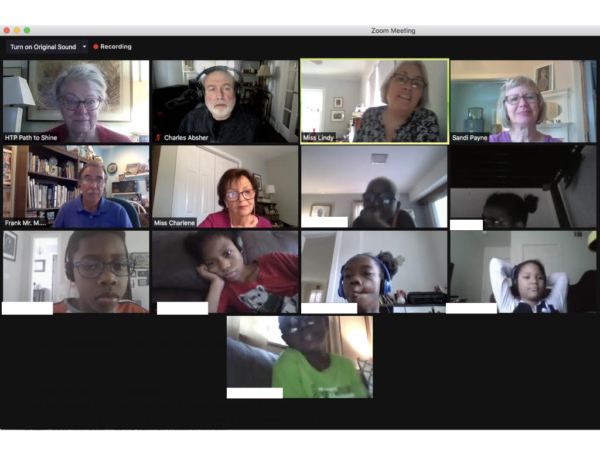[Episcopal News Service] In a typical year, Path to Shine mentors gradually build trust to support the growth of elementary school students who live in poverty across Georgia. In 2020, as the pandemic abruptly destabilized students’ lives, the mentors and tutors have scrambled to sustain these relationships.
“COVID messed everything up,” said Path to Shine volunteer mentor Lindy Newman, a retired second grade teacher and member of Holy Trinity Parish in Decatur.
Founded in 2010 by the Rev. Lesley-Ann Drake, a deacon, and based at St. Benedict’s in Smyrna, Path to Shine volunteer mentors and tutors have logged more than 50,000 hours working one on one with students in its after-school programs, which have spread to 17 locations across the northern half of the state, from Pulaski County in central Georgia to Cherokee County, a suburb of Atlanta.
Early on in the pandemic when Georgia suspended in-school learning, Path to Shine shifted online. Even as public schools across the state have reopened, mentoring and tutoring has continued online since volunteers tend to be older and at a higher risk for COVID-19.
The initial shift created a challenge for Drake, just days after she was honored by state legislators with a servant leadership award. She had founded Path to Shine without a background in education and COVID required additional faith and resources.
“What I truly believe is that if I can do this, anyone can do anything if you are willing to shut up and listen and ask for help,” she said. “God provides resources you don’t have.”
Children’s support at stake
In Georgia, 1 in 5 children live in poverty, putting them at an educational disadvantage and limiting their access to health and social services. Path to Shine mentors and tutors typically work one on one with students in weekly 2.5-hour after-school sessions that include tutoring, games and field trips.
Bridging differences one on one “makes the kingdom of God alive and vibrant,” said Atlanta Bishop Rob Wright during a 10th anniversary online celebration of Path to Shine, which also is a Jubilee ministry — The Episcopal Church’s network of poverty-focused ministries.
Early in the pandemic, Drake and other community-based ministry leaders met with Wright, who encouraged them to “lean into” the pandemic and its isolating challenges. No matter how much their spheres of influence may have shrunk, they needed to strive to always “be the church,” Drake recalled him saying.
For Path to Shine mentors, “leaning in” has meant modeling the trust and commitment they teach and making an effort to maintain contact with the students.
“The most important thing we can do is maintain relationships,” Drake told mentors. “A lot of the students and families don’t have [landline] phones, so you send a card or letter and enclose a stamped envelope so the child can send a letter back to you.”
Second, recognizing that students in poverty often go hungry, the mentors delivered grocery cards. “Students rely on school for food,” Drake said. The next delivery was a bag of puzzles, games and bingo — everything that a student would need as Zoom mentoring began.
Troubleshooting at a distance
Path to Shine’s board set aside $32,000 specifically to address pandemic-related needs. Drake worked with other nonprofits to provide Wi-Fi hotspots, computers and earphones for students in need.
Not every relationship was saved, though. Newman lost touch with a student she had worked with for five years.
“He wasn’t responding to calls, so I knocked on his door and I could hear their dogs yipping and yapping, but no one answered,” she said. “We want to keep the mentoring open all the way through his schooling — if we can get back together.”
At first, Path to Shine volunteers found online meetings with children ages five to 11 to be a challenge, and Newman, who before the pandemic taught at an online charter school, offered them advice on how to engage students on screen.
Her husband Charles Absher, also a longtime volunteer, took easily to distance mentoring.
“It’s a little less stressful online,” said Absher, a musician who composes a new song for his students each week. One reason he volunteers, he said, is that he believes turning away someone in need is like turning away Christ.
Mentoring matters
As COVID-19 continued to spread in Georgia in October, during its 10th anniversary celebration, Path to Shine’s first graduate told his story. Eloy Meza, 18, earned scholarships to attend nearby Kennesaw State University and plans to transfer to Georgia Tech for his degree in software engineering.
As an elementary student, though, he was as lost as “a confused puppy,” he said. He was matched with a Path to Shine mentor who helped him envision the future, set goals and answer questions about attending college as a first-generation student.
“I really just needed guidance,” Meza said at the online event. Mentoring “helped me find that guidance and established that confidence in me.”
– Michelle Hiskey is a freelance writer based in Decatur, Georgia, and a member of St. Bartholomew’s Episcopal Church in Atlanta.
"continued" - Google News
December 17, 2020 at 03:02AM
https://ift.tt/2WsGwrj
Throughout pandemic, Episcopal-led mentors, tutors have continued to serve Georgia students online - Episcopal News Service
"continued" - Google News
https://ift.tt/2WiTaZN
https://ift.tt/2YquBwx
Bagikan Berita Ini















0 Response to "Throughout pandemic, Episcopal-led mentors, tutors have continued to serve Georgia students online - Episcopal News Service"
Post a Comment